John Hurrell – 7 April, 2009
Jäger is a particularly interesting painter. In the past he was worked on the back of sheets of glass and arranged his marks of thin paint in floating clumps. I like the awkwardness of these page paintings (painted drawings, perhaps, is more accurate). Their lopsidedness gives them a Gustonesque vulnerability. They are not too sweet, they have a raw earthy colouration, and their wonky tottering quality is not contrived.
Auckland
Michael Jäger
Auckland haendisch
7 April - 26 May 2009
Michael Jäger is a Cologne-based artist who likes to work with painted fragments: delicately textured, sensitively drawn squiggles or strokes of grainy watercolour that are stacked up against a vertical edge of each small sheet of paper. They fall towards the centre of the page like shredded salad and other fillings in a sloppily made burger.
He piles up marks like they had spilled off a rubbish cart, scraps discovered on the road and thrown up on a heap that is sliced in half by the edge of the page. Like Baudelaire’s rag picker; but with abandoned flourishes, wipes and scruffy scumbles instead of old clothes. They are not quotations he’s using, but they almost could be. They are categories of coloured, scratchy mark - surrounded by lots of white paper at the middle and top of the page.
Jäger is a particularly interesting painter. In the past he was worked on the back of sheets of glass and arranged his marks of thin paint in floating clumps. I like the awkwardness of these page paintings (painted drawings, perhaps, is more accurate). Their lopsidedness gives them a Gustonesque vulnerability. They are not too sweet, they have a raw earthy colouration, and their wonky tottering quality is not contrived. There seems to be an underpinning principle at work, the way they enter through the side edges of the paper sheet.
One discussion around these images is that it is as if one of his older, bigger paintings has exploded, scattering its pieces far and wide, and the artist has collected them up and popped them into jar or shelf-like pages. However the marks themselves are delectable items of contemplation; not damaged or mangled in any way. They relate perfectly to each other as horizontally layered compositional elements.
At Muka he has also made four architectural lithographs where the loose thin marks are woven into planes of solid opaque colour that have geometric gaps for them to peek through. They are vaguely like coloured bushes wildly bursting through a quickly assembled dwelling, and are displayed horizontally and flat on a seat to perpetuate the ‘explosive’ sense of the watercolours own irregular placement on the walls.
Jäger is a little like Judy Millar in that he is fascinated by the relationship between painting and architecture, and likes to repaint gallery walls so he can rehang and recontextualise his images. Last month he did this at RMIT in Melbourne with David Harley in a U-shaped space. In Muka though he has worked on one wall only, drawing with third inch lines of tape and using pots of tonally and chromatically clashing colours he has never found in Germany.
The page of watercolour painting he positioned against this complicated backdrop was unusual in that its painted ‘stack’ of marks was really two stacks butted together in juxtaposition. It seemed to comment on the opaque brown, pink, orange and blue horizontal planes delineated on the wall, and a tumbling configuration of wiggly spaghetti-like white lines that referred to fluffy edges.
I’m not sure about the harsh severity of the paint and tape wall painting - but the soft gently speckled marks of the streaky watercolour works take your breath away. It’s a terrific exhibition.
- John Hurrell
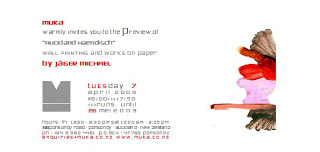
 Two Rooms presents a program of residencies and projects
Two Rooms presents a program of residencies and projects Advertising in this column
Advertising in this column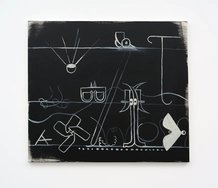
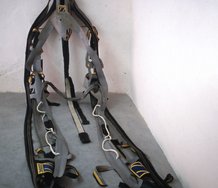
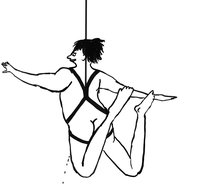
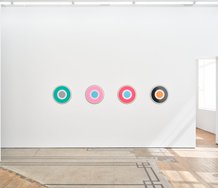
This Discussion has 0 comments.
Comment
Participate
Register to Participate.
Sign in
Sign in to an existing account.